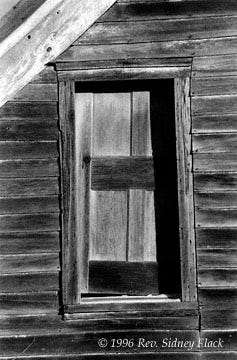The Deconstruction of Christian Scaffolding
How Christian parenting advice has contributed to the great dechurching
As I analyze various Christian resources, I often think about the people who lived them. What was it like to parent according to the suggested principles? To be a child “trained up” by them? A family spiritually formed by them?
I recently finished a chapter-by-chapter examination of Ginger Hubbard’s popular book “Don’t Make Me Count to Three.” Ginger wrote her book to be a practical application of the theological framework offered in Tedd Tripp’s best-selling “Shepherding A Child’s Heart.” Both books offer a nouthetic (ACBC “biblical counseling”) approach to parenting—a spiritual micromanagement of thoughts, behaviors, and hearts. I’ve written before about this laser focus on a child’s heart, a framework that trains sincere, devout parents to cultivate Christian scaffolding in every layer of family life.
This is an understandable desire, but what if the starting presuppositions are askew? What if the scaffolding is flawed?
I suspect that a key reason so many Christian adults are deconstructing is because they were raised in Christian homes and churches fully committed to constructing Christian faith, often in very specific ways. Resources like Hubbard’s and Tripp’s are notably prescriptive, for instance: repeated themes of idolatry and religiosity applied to children of all ages, post-spanking hugs accompanied by teaching about Christ’s atonement, and Bible verses paired with expectations for instant, cheerful obedience.
But are these commitments to presuppositional Christian teaching an unqualified good? Is more-the-better and earlier-the-better catechesis necessarily a benefit to faith formation? And what if the presuppositions are wrong?
A Necessary Deconstruction
It wasn’t that long ago that I was reading Paul’s first letter to the Corinthians and discovered that deconstruction as a concept is right there in 1 Corinthians 3:10-15.
Whatever our opinion regarding the term itself, I’d like to suggest that deconstruction as a concept is a necessary phase of spiritual development that will come to every Christian at some point, perhaps multiple times. Let’s take a closer look.
The church in Corinth was, like so many young congregations, chaotic and struggling with division and confusion. Paul opens chapter three by discussing loyalties to various well-known church leaders, and how that’s caused division. People in this fledgling church have come to identify themselves based on who they follow, and Paul chastises them for it. Paul’s caution in this chapter is twofold: first, he warns people to not get wrapped up in worldly follow-the-leader divisiveness: “no more boasting about human leaders!”
But there’s a second caution here, one found in verses 10-15, a segment I used to read individualistically, as personal warning to take care what *I* build (which is of course applicable). But Paul's original point, remember, is a caution against letting loyalties to different leaders (and their teachings) become definitive.
That, along with whom Paul is addressing in vs. 10, frames this segment a bit differently.
Paul is addressing the builders. He is cautioning the teachers and leaders to be careful with what they build. Are teachers careful like Paul to only build on Christ? Do they view God's people, as God’s building, as God’s sacred temple (stunning language!)?
The reality is that while Christian leaders build with all manner of materials, only what is constructed on the foundation of Christ Jesus will endure. Endurance is proven by . . . what withstands scrutiny, exposure, and, well, a kind of deconstruction. With Christian parenting teaching in mind, consider how children who have been raised in Christian homes grow up into adulthood, where many of them face a spiritual-developmental milestone of determining if and how they will engage God for themselves. Not through the Sunday School answers they were given. Not through the memorized Bible verses. Not through the faith of parents or grandparents or mentors, however beloved (or not). But for themselves.
Jesus Himself, our rock-solid, firm foundation, holds up well to the scrutiny of deconstruction. Indeed, many people who’ve exited the pews find themselves still attached and even deeply committed to Jesus. But the layers of Christian scaffolding that permeates so many of these Christian parenting resources? Not so much.
Sometimes, people simply shed things they previously believed were essential as they untangle the tangled up legalism and heavy yokes of spiritual performativeness they’ve been offered. Other times, an external exposing fire lays all bare: many young people name the fall of trusted leaders, hypocrisy, moral injury, and failed response to abuse disclosures in every denomination as reasons for the great dechurching of America. Perhaps St. Paul’s metaphor is especially apt for our modern era of deconstruction. Could it be that the quality of what has been built is being tested?
When the Builders Blame the Building
Unfortunately, rather than being sobered by this thought, many Christian communities instead shame God's people, God’s building, for scrutinizing whether things they've been taught align with the teaching and life of Jesus Christ. He is indeed the unchanging foundation of the church, but many are discovering that popular and beloved leaders and teachers have offered them unstable DIY remodels or sketchy add-ons that don’t hold up. Shaming people for questioning is especially topsy-turvy, because Paul's words regarding reward and judgment in vs. 14-15 are directed toward the builders.
According to Paul, revealing and refining is necessary and inevitable, especially when unquestioned loyalties to church leaders and tribalistic divisions flourish. And the persistent reality of inaccurate and incomplete teaching (whether well-intentioned or malicious) means that cultivating discernment has always been the work of Christians. While Paul’s warning regarding fire is for the builders, the encouragement of vs. 16-17 is for all God's people, reminding them of God's care and of the Holy Spirit in their midst. This has the potential to reassure Christians who fear this process of scrutiny and—dare we say it—deconstruction.
When I read vs. 12—where Paul reaches for the vivid imagery of wood, hay, straw, gold, silver, costly stones— I can’t help but think of the parenting scripts and charts and “gospel-saturated” moments that I’ve read on so many pages over the past years. It’s all so understandable that Christian parents would deeply desire to know the joy of children “walking in the truth” and then attempt to secure this by constructing faith for their children. But that zealous and often exhaustive construction endeavor itself means that the question isn’t whether children raised in Christian homes will deconstruct —indeed, I think it will happen to all of us who’ve been catechized via human spiritual instruction—but whether the quality of what has been built is aligned with Jesus Himself.
If parents have added rules and rules upon rules and charts and interpretations and spiritual micromanagement, then there will be more for the children and young people and new adult converts who came to faith in those environments to later deconstruct. Is God incapable of preserving them . . . and all of us, really, who make up the church, the sacred temple in whom He dwells (!!!) through this process?
Paul’s hope is certain: no exposure, no fire, no deconstruction can alter the rock-solid, firm-foundation of Jesus Christ. So why is it, then, that Christian parents (and Christian pastors in church families) are often so troubled by the concept of deconstruction? Up next, in Part 2 of this post.










I think a lot of Christians hear the word "deconstruction" and automatically associate it with other religious buzzwords like "backsliding," "straying," "turning away from faith," and more. What the Christian community often fails to realize is that for many, deconstruction is a deepening of one's beliefs by purposefully weeding out falsehoods. When I began my own journey of deconstruction in my late teens, I felt a measure of guilt because my questions and doubts were treated as unbelief in my religious community. As I continued into my early twenties, I began to feel more assured in my convictions, and was able to hold my ground on the idea that deconstruction was supplementing my faith, not replacing it.
I'm looking forward to reading Part 2 of this post! This edition really resonated with my and my journey – thank you for sharing!
I really appreciate this Marissa. As our 3 sons (ages 24-30) figure out what they believe present tense, my husband and I have done much soul searching about the mistakes we made. We were too quick to believe the "experts" often times over-riding our instincts. We've made many apologies to our young men.